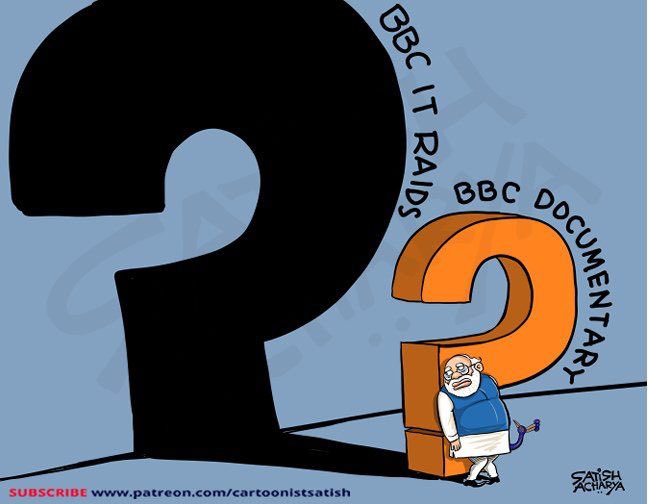The Income Tax department who say not as raid but ‘survey’ at the BBC office here continued for the third straight day on Thursday as officials gathered financial data from select staffers and made copies of electronic and paper data of the news organisation.
The operation that began at the British Broadcasting Corporation (BBC) offices in Delhi and Mumbai around 11:30 am on Tuesday has clocked more than 45 hours now, officials said.
The survey is going on, they told PTI. Authorities had said on Wednesday that the exercise would continue for some more time, saying the “exact time frame to call the operation closed rests entirely on the teams on the ground”.
The survey is being carried out to investigate issues related to international taxation and transfer pricing of BBC subsidiary companies, officials have said.
The survey teams are seeking answers on financial transactions, the company structure and other details about the news company, and are copying data from electronic gadgets as part of their task of collecting the evidence, tax officials had said.
Reports usually mention searches and surveys interchangeably but there is a difference between these two terms. So what is a survey means .
Tax authorities conduct surveys to unearth hidden or undisclosed income and property. Here, the main focus is the collection of information.
It is also ascertained in a survey if a person or a business has properly maintained its books of accounts or not.
It is guided by Section 133A of the Income Tax Act, 1961. It was inserted in 1964. Some amendments were made to the section through the Finance Act, 2002.
What a search means …
Searches are thorough inspections of buildings, places of business, and other places to find hidden income or wealth in tax evasion cases. The authorities are also given the power to seize the documents, assets, bullion etc., which have been hidden from the authorities. That is why they are also called “search and seizure” operations.
In common parlance, it is called a “raid”, but no such word exists in the I-T Act of 1961. Searches are conducted under Section 132 of the I-T Act.
So why one should not confuse surveys with searches..
Surveys can be conducted during business hours, searches have no restrictions . However Searches allow seizure of unaccounted assets, during searches authorities have to be cautious and can be held accountable later for impounding
In case on non-cooperation, raiders can break open any door/ window, nothing such can be done during surveys
Surveys are a milder form of search operations. In surveys, the main purpose is to find information. While in search and seizure, the main purpose is to find unaccounted wealth and records of such transactions.
The surveys can only be conducted during the hours at which the business conducts its operations. On the other hand, searches can be done at any hour.
Surveys can only take place at the place from where the business or profession is carried out. In search operations, there is no such restriction.
“Search operation is regulated by the provisions of the Code of Criminal Procedure, 1973 which allow the raiding party in case of non-cooperation to break open any outer or inner door or window to get access to the premises where the search warrant needs to be executed. However, such power is not conferred for survey proceedings,” Geetanshu Bhalla, director (Tax Regulatory), The Virtual Compliance told media house
“Few rights of taxpayers get suspended during the execution of search warrant however that is not a case during survey proceedings under Income tax Act,” Bhalla added.
Before the Finance Act of 2002, the authorities had no power to seize any asset during the surveys. However, after the amendment, the authorities can impound the books and documents surveyed but only after recording the reasons for doing so.
Also, they cannot be retained for over ten days without the permission of the Chief Commissioner, Commissioner, Director General or Director.
In search and seizure operations, the authorities can seize any document or asset except the stock-in-business. They can break any locks if they are not provided with the keys. They can take the help of police officers or any other central government officer for the whole process.









